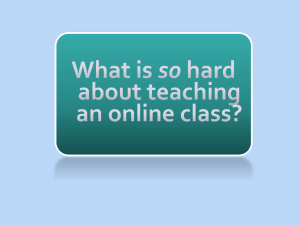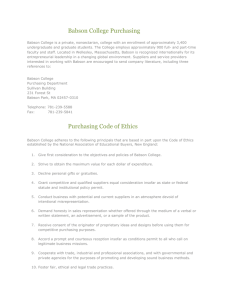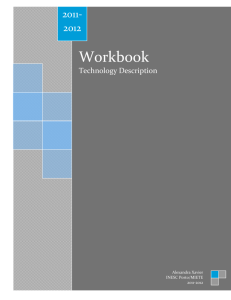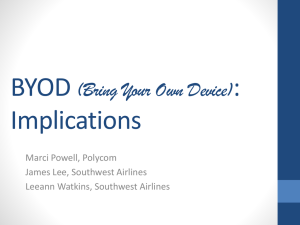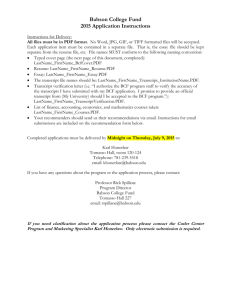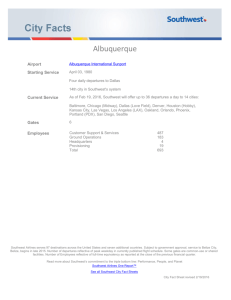Creating a Great Spirit of Service at Southwest Airlines: An Interview
advertisement
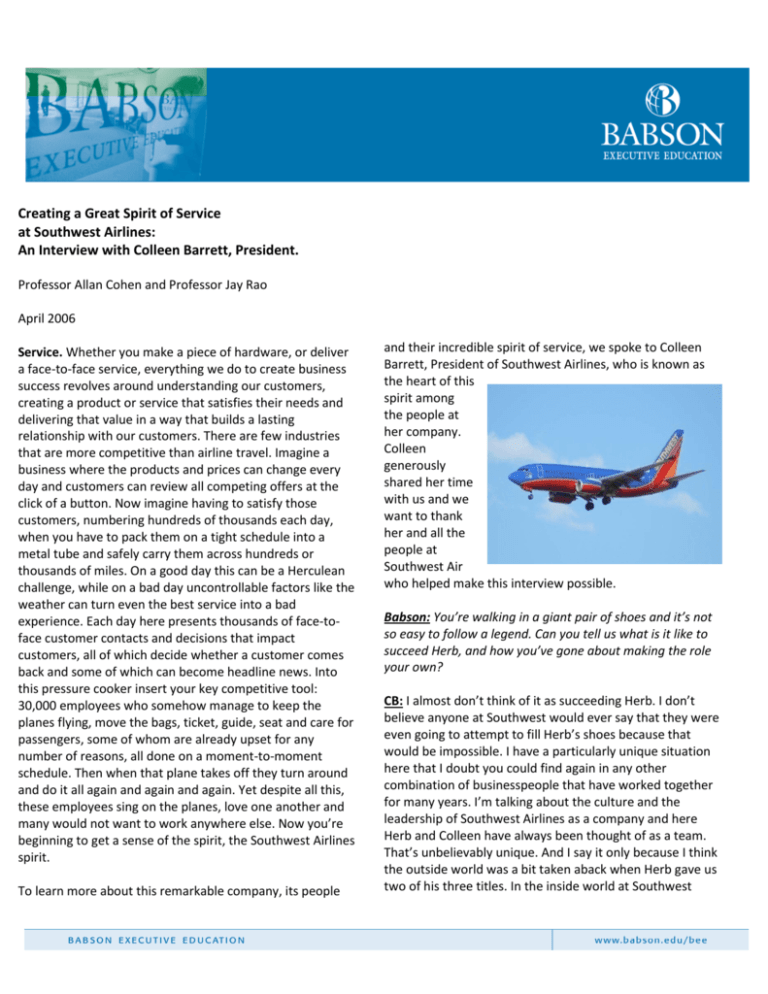
Creating a Great Spirit of Service at Southwest Airlines: An Interview with Colleen Barrett, President. Professor Allan Cohen and Professor Jay Rao April 2006 Service. Whether you make a piece of hardware, or deliver a face-to-face service, everything we do to create business success revolves around understanding our customers, creating a product or service that satisfies their needs and delivering that value in a way that builds a lasting relationship with our customers. There are few industries that are more competitive than airline travel. Imagine a business where the products and prices can change every day and customers can review all competing offers at the click of a button. Now imagine having to satisfy those customers, numbering hundreds of thousands each day, when you have to pack them on a tight schedule into a metal tube and safely carry them across hundreds or thousands of miles. On a good day this can be a Herculean challenge, while on a bad day uncontrollable factors like the weather can turn even the best service into a bad experience. Each day here presents thousands of face-toface customer contacts and decisions that impact customers, all of which decide whether a customer comes back and some of which can become headline news. Into this pressure cooker insert your key competitive tool: 30,000 employees who somehow manage to keep the planes flying, move the bags, ticket, guide, seat and care for passengers, some of whom are already upset for any number of reasons, all done on a moment-to-moment schedule. Then when that plane takes off they turn around and do it all again and again and again. Yet despite all this, these employees sing on the planes, love one another and many would not want to work anywhere else. Now you’re beginning to get a sense of the spirit, the Southwest Airlines spirit. To learn more about this remarkable company, its people and their incredible spirit of service, we spoke to Colleen Barrett, President of Southwest Airlines, who is known as the heart of this spirit among the people at her company. Colleen generously shared her time with us and we want to thank her and all the people at Southwest Air who helped make this interview possible. Babson: You’re walking in a giant pair of shoes and it’s not so easy to follow a legend. Can you tell us what is it like to succeed Herb, and how you’ve gone about making the role your own? CB: I almost don’t think of it as succeeding Herb. I don’t believe anyone at Southwest would ever say that they were even going to attempt to fill Herb’s shoes because that would be impossible. I have a particularly unique situation here that I doubt you could find again in any other combination of businesspeople that have worked together for many years. I’m talking about the culture and the leadership of Southwest Airlines as a company and here Herb and Colleen have always been thought of as a team. That’s unbelievably unique. And I say it only because I think the outside world was a bit taken aback when Herb gave us two of his three titles. In the inside world at Southwest there simply wasn’t even a transition in the sense of Herb and me. I do think it’s important to at least say that we spoke from the same heart, the same philosophies and core values. So internally that was not a big stretch for anybody. know that it would elsewhere. And it’s not that unusual for us to disagree. We have very spirited discussions. Babson: Do you find people will try to play you off against each other? Babson: How did it come about that you and Herb got so close that you could work from one heart? CB: I’ve worked with Herb since 1967, even before Southwest existed on paper. I’d love to tell you that it was a brilliant strategic plan, but it wasn’t. Things rarely happen that way. But sometimes you just form an incredibly natural business partnership. And I think the ones that are the most successful are the ones that aren’t really planned. I put my whole office through the Myers-Briggs personality type test, including Herb. The facilitator just about died, because she said she’d been teaching this for 20 years, and she had never seen two people so far apart on just one of the three letters. We were both extroverts, but we were two hundred and six percentage points apart on the one letter we did not share. She said she’d never seen anything like it and was surprised that we hadn’t killed each other. I suspect that’s probably why we’ve worked so well together, we just complement each other so well. Babson: What is it that you do that he doesn’t? CB: He is brilliant, he’s a visionary, and he is definitely a big picture sort of guy. I am very methodical, very systematic, pragmatic and not a global thinker or a visionary. I am definitely a do-er and a firefighter. I’m an A to Z person and it works. He is totally spontaneous in everything he does. I don’t have a spontaneous bone in my body. And so it’s been a struggle, but somehow we’ve made it all work. Just to complete the picture, in terms of stepping into Herb’s shoes, he is Executive Chairman, which I think a lot of people misunderstand. He is here all the time, and although he only kept two functions, they happen to be immensely important to our success. He gave up his CEO title, and he gave up his President’s title, now Gary and I share those functions. We each have the role and the title, but Herb still maintains strategy, aircraft, and fleet planning, which is a huge part of our business. Herb is in the process of trying to transition those over to Gary. Babson: It sounds like it makes for a very good partnership. CB: It does. It makes a lot of sense at our company. I don’t CB: No, not really. For many years one of the problems that I faced was that because I was so associated with Herb in my initial stages of leadership, some people weren’t always sure that the ideas I expressed were my own and that I didn’t know how Herb felt on the subject. That was a little difficult but it isn’t a problem today. Babson: Let’s talk some about the company and its spirit. Somehow you’ve gotten a whole group of employees who feel like they own the place. That’s generally much harder to do once you become large with many locations. How do you manage to spread the spirit, keep it going and get new employees involved? CB: We start educating people in terms of what it means to be a Southwest employee when they’re at the applicant stage. And we’re pretty darn clear on our expectations for people. No matter what they’re signing on to, whether it’s a line entry-level position, supervisory, or leadership position, we aren’t shy about describing what the requirements are. We do a better job of hiring than most because we spend a lot more time on hiring than most companies do. We’re also disciplined and religious about watching people during the probationary period and getting rid of our mistakes. We’ll work with anybody that’s trying. But if someone is exhibiting a poor attitude, or behavior that goes against our grain and our expectation, we get rid of bad apples as quickly as we can. If we’re as good about promotions as we are about hiring, we should be able to perpetuate that leadership style, the Southwest way of life and core values, because we’re putting the proper leaders in each location. You have to work at it every single day, and you have to hold people accountable. We have a saying at Southwest, “First yourself, and then everybody else.” That’s why I call this a way of life. Babson: Colleen, you mentioned promotions and that obviously sends a big signal. What is the promotion process like at Southwest? CB: If you’re talking about pure leadership positions, it is very much like an applicant interview process that is done in a disciplined way. You post a position and let people show a letter of interest, or a bid for the job, and almost without exception the interview process would be sort of a team approach, where you might interview with the person that was doing the hiring, or the person who had the vacancy. That person might have several of their direct reports interview you individually, or together as a team. Our people department, that’s our human resources group, would be part of the interview process as well. And at Southwest we allow the people department to literally have a vote. They can’t tell you that you must hire someone, but they can tell you that you can’t hire someone. Babson: Do they have veto power? CB: Yes, where the applicant doesn’t have the attitude or behavior we are looking for. If you want to have a big quarrel about it you can. It doesn’t happen often, but they can come to me, or they can go to Gary and try to resolve it. The idea is that there should be a consensus on the hiring, or the promotion. Babson: You were commenting about how much time you spend on new hires; and it reminded me of how India was run by the British. They trained people to think like the Queen, and then sent them out so they didn’t have to ask questions, they just knew what to do. CB: I love it! That’s so interesting. I was having a bit of a disagreement with a fellow officer over whether the word “integrity” should be part of our leadership expectations. There are 32 people in the room having this discussion and fifteen different ideas for what the word “integrity” meant. Finally I said, “Well, why don’t we just forget all that, and just describe it as ‘Do the right thing?’” That provoked another two-hour discussion. I think it’s better to make things generic, and put the responsibility on the person’s heart and soul than it is to define things so tightly that you limit their definition. I’ve never wanted to define the Southwest spirit. Babson: The real challenge comes when somebody has acted in a way they think is within the spirit, or within doing the right thing and others disagree. And then the question is: how do you deal with it? CB: To me that’s what leadership’s all about. I don’t want to write a 72-page memo, or a book that sets out every scenario. People basically know what’s right and what’s wrong. There are differences between integrity, ethics and morality, but we shouldn’t spend 3 weeks on something that could have been done in 20 minutes. Babson: Many would say you’re now the number one company in your industry. Do you face specific challenges in attracting employees who fit into your mold as you grow? CB: We’ve been very lucky. As a matter of fact, some of our publicity about our uniqueness is a bit of a downer because people so want to be part of what they consider to be an unusual group, a maverick sort of place. We were covered years ago on 60 Minutes and I received about 17,000 applications the next day. Many of these were from people who were drawn by a belief that our culture was so different and unique, they thought we were looking for comedians and that’s not at all what we do. Babson: External visibility and reputation can be a blessing and a curse. CB: You can’t imagine some of the application letters that come in, and the things people add just to get your attention. We pride ourselves in our uniqueness, but I don’t want people to misread what that uniqueness is all about. I think one of the best freedoms that we offer to our employees is the freedom to be themselves, the freedom to be an individual. Most of corporate America wants robotic people who look alike and act alike, but that’s the antithesis of what we want. Babson: Can you tell us about the Culture Committee at Southwest? What do they do and how does it help the company? CB: I decided to form the culture committee because I felt one of the most important things we could do for a new hire in their first year was to bring them through headquarters. Here the history and our culture is all over our walls, you have to see it, you have to feel it, you have to touch it. You can’t do memos about it. I don’t know if you’ve been to our headquarters, but it’s like an open scrapbook and that’s on purpose. Babson: It sounds like what you’re saying is that the culture committee serves two purposes. The first of which is to have people rotating through the committee and then evangelizing. Is that how it works? CB: That’s right. They were able to receive some culture and meet their department heads. But the more we grew, the further our locations were from the Dallas headquarters. So if they were in California, or Seattle, they would have to spend three days traveling in order to have one full day here. I thought we needed to bring our culture to them. The first year I literally selected 48 people that I knew exemplified everything about our customer service approach and our family spirit and basically walked our core value talk. I asked them to go out for a year and then tell me what we need to do in order to enrich the culture, improve it, or just keep it going. The amazing thing is that they did this all on their own time. Babson: You’re getting feedback and ideas from them? CB: Yes. My goal was that eventually we would have local culture committees in every location, which we now have. I still use the company culture committee because I try to have it represent basically all regions and all primary disciplines that we have within the organization, just to be sure that we’re all communicating from the same page. Babson: Can you think of an example where, as a result of this process, something major changed in the company? CB: I can’t think of a huge change, but I can think of many, many influences that the culture committee has made. One of my favorites is our Heroes of the Heart program where we recognize a group of unsung heroes, people that are just not in the limelight. We’ve turned this into an annual event for the culture committee and hold it on Valentine’s Day because we are the love airline (Southwest Airline’s stock symbol is LUV). During the first couple of years we had so many public contact people that it was much easier for them to get recognized for positively outrageous service. One of the things that came back was, “I work in a back room and I punch a keyboard all day, how am I ever going to get any recognition?” Well, that was a very good point. So now one of the things that we do is to have a sub-team that works on soliciting nominations for the Heroes of the Heart. In this way we can recognize a work group, or a work team that gets very little recognition because of the nature of their work, but that work contributes mightily to our overall success. We celebrate everything here and this is a very big, big thing for us. We’ve been doing the Hero’s program since 1990 and we’ve been able to keep the awards secret every year except for one. So 99% of the time it is truly a surprise to the work group. Everybody pours into our lobby. We make a big introduction and one of the great things about our people is that they are just as happy to see someone else getting recognition as if they were getting it themselves. You know we do hire pretty good, caring people. Babson: We have been talking about culture and how it permeates the experience that the customer sees and receives. CB: Oh yes, they see it, feel it, and touch it. And we’ve been very good about under-promising and over-delivering. Probably the best lesson that Herb ever taught me as a leader is the importance of storytelling; he’s a great storyteller so we tell stories all the time. And when we tell stories, we celebrate everything. We celebrate the smallest positives for proactive customer service delivery. This is how we teach, or lead by example. I know it’s changed the last couple of years, but for years we were the low fare carrier in the United States. We literally had no amenities. We were very honest about who we were. But it’s not like we had lots of ways to earn tremendous commendations, and write-ups in the paper. The only thing that could accomplish that would be the goodness of the hearts of our people. And the only reason that it was noteworthy is because other airlines weren’t doing it and they did have amenities. So this became the focal point of the way customers started talking about us. Later we went on the campaign to be proactive about it. That’s probably my best contribution to this company. My goal in life was to reach a customer who has had a really bad experience, especially if it’s something more emotional or traumatic, a really scary or unpleasant experience. My goal in life is to reach them before they can reach us. Now that is unbelievably labor-intensive. The only way I can do that, or the only way that a company can accomplish it is if every employee out there takes ownership over it. My goal is to have something in their hands in 72 hours in writing, with an explanation, with a “We’re sorry” gift. And it just doesn’t happen in other businesses. You do it because it’s the right thing to do. But the value is that it wins us customers for life. Babson: Southwest has always been known for the way its cabin and in-flight crew deliver great experiences. But now there are some new entrants that seem to be giving travelers a very different type of in-flight experience. Jet Blue’s satellite TV, for instance. Do you see a change in customers’ expectations of what they want for their in-flight experience? CB: I will tell you that we are not being bombarded with requests for in-flight entertainment. We talk to our customers all the time, we listen and we observe. I won’t tell you that we will never put that stuff on our airplanes. But that is my personal opinion. Up until a couple of years ago we were probably 85, 90 percent short haul or medium haul service. So adding long haul service to our mix may change what a customer is willing to give up for price. I sound like I’m preaching, and I do preach to our employees a lot about this. We can’t own the low fare niche if we don’t own the low cost niche. The reason we’ve been able to own the low fare niche is because we have always had the best cost. And now that we are a mature company of 34 years old, we have many cases where we have the highest paid employees. Jet Blue, being a new carrier, has a much lower salary scale. We could never afford to put TVs on all of our 436 airplanes and expect to be able to still charge the same price, even if we had people pay for it. What I would like to provide is sort of wireless access to people so that they could bring their own DVDs, and use them all on the plane, instead of wiring 436 airplanes. We’re certainly looking at all of it. Babson: You have confidence that the processes within the company can let you make the smart decisions calling for more complexity and differentiation? CB: Yes. While we have to constantly fight bureaucracy, which may be a little harder today than it was ten years ago, for our size we have to have some structure. But I don’t want to be too structured. We certainly have to think strategically. As long as people just keep going back to the basics and revisit the list of strategies, which traditionally we’ve done every 5 years. With every new suggestion, or every change, you measure it against the list of strategies that you’ve agreed to. Babson: So do the disagreements get more protracted as you’re bumping up against the culture? CB: No matter what our profession is, I think most of us tend to hire people that share our basic philosophies and strategies. Usually when people join you, they’re joining you because they want to be there, not just because they’re looking for a paycheck. Certainly for a leadership position, I wouldn’t offer a job to someone that wasn’t dying to be part of Southwest Airlines. If you’ve hired people that have managed to build up some tenure with you because they do subscribe to your leadership philosophies and you promote from within, then chances are that you’re not going to have too many difficult disagreements with people. Of course you don’t want a bunch of yes-people. Babson: Yes, that’s the other side of it. CB: I doubt you’re going to have too many knock-down, drag-out fights. Because if they’re as passionate about the company as I am and the fights are really bad, then somebody’s going to part ways. I don’t want that to sound like it’s a dictatorship, because it’s not. Babson: I understand that they just won’t feel they fit. CB: If you’re not a touchy-feely person, or have a sense of humor about yourself, you’re going to be so uncomfortable in this environment that we’re not going to have to let you go, you’re not going to be comfortable and you’re going to leave on your own. Babson: Do regional differences present a challenge for company culture and spirit? CB: The reason I’m laughing is I was raised in Vermont. When we were going to go into Providence and Manchester, Herb was a little worried that perhaps the area was a little too provincial for our laidback style. I was upset over that because to me people are people; they just want to be treated with respect. New Englanders also really want a good value for their dollar. So I figured we would be fine if we treated people the way we always do, with respect, and if we showed them they were really going to save some money because they had been overcharged for so long. But I was still a little nervous about it because he was nervous and felt so strongly. I knew I was right on this when I got a call from a Providence ramp agent, the guy that loads bags. And he told me that he was in a grocery store in Providence with his “Southwest” baseball cap on and a woman came up in her farm clothes and gave him a big hug saying “I am so excited. Thank you, thank you, thank you for coming to my community.” And she went on about how she had not been able to see her grandkids because she couldn’t afford to fly more than once every two or three years and now she could go once a quarter. Well, it just made my day. We have also gone into parts of the country where we’ve had a real problem. When we first went into California, my flight attendants were all coming back to me in tears saying, “I don’t want to serve those flights.” I asked “Why?” And they would say, “Well, they hate Texans.” And I said, “You’ve got to be kidding me.” And they said, “No, they make fun of our accents and they make fun of our hair.” I said, “Come on!” And then we had to change how we provisioned our airplanes, because everyone in Texas drinks beer and whiskey, but in California all they drink is wine. So we’ve had to learn to make a lot of changes. When we went into Chicago, we found it was a heavily unionized part of the world, and when people got mad, they were very confrontational. I mean they would literally almost jump over the ticket counter at you. Back in those days, for the most part, our ticket agents were tiny little woman. I had to go find a couple of big, burly ramp agents and talk them into becoming ticket agents just to put them out there at the ticket counters. Babson: It sounds like you don’t necessarily start with a plan up-front for fitting into a new market. You go in and then watch and see what the reaction is. CB: That’s right, you really don’t know until you get there. You also have to realize that we’re 83 percent unionized. Which most people find surprising because we’ve had such a good reputation in terms of our employee relationships. But when you’re unionized there is a process when new jobs open up and they get to bid for new locations. So it’s only the leadership positions that you have any say about. We’ve got a pretty young work force and they love to move around, so the more attractive the destination, the more interest they have in moving. We have some people that move every year. I can’t imagine that kind of life, but some people like it. Actually there are very few local new hires. I can’t think of a city where we’ve ever had to hire more than 8 or 10 new people because of the interest our people have in moving to our newest city. Babson: There can’t be a lot of companies in the United States where people at the top would easily talk about heart. How do you account for that, or is that just the way your people talked all along? CB: I can’t tell you how many times I’m asked that question and I’ve given this answer more thought than you can imagine. The reason goes back to our values and the beginning of the company. This is Texas and they have to do things bigger and better than anyone else. We had to make a huge splash with the media to get any attention, but we had no money. It was back in the seventies and we capitalized on the word “love,” because we’re based at Love Field, so love was our theme and we had girls in hot pants. We did all that flamboyant stuff and saw that it worked. Then we took that word “love” which was our stock symbol and we stretched it about as far as you could. Over the years it has evolved into a wholesome sort of American and apple pie. Herb and I always had a big thing for teamwork and family. That was probably the central core of what we wanted Southwest to be. We wanted Southwest to be a very egalitarian airline from the very beginning. We felt that people were just being gouged on price and that only the elite could fly. We wanted to be the airline for the people. We wanted everyone to be able to fly within the state of Texas and we thought there was a big enough market to do that, if the price was right. That was our goal in life. So it’s not unusual for us to be talking about company spirit and to also talk about family. We do things as a business that you would do in your normal families, and we just try to get our people to think of work and home as being the same sort of environment. That was our biggest point of difference compared to most of corporate America. We tell our people “Don’t leave your real personality on the doorstep when you come to work. Bring who you are to work, and share that specialty about you with each other and then with your customers every day. And if you do that, it won’t seem like work.” I am a very simple, hardworking person who has had to work hard for everything in my life. So this was basic grade school stuff to me. Herb would go out and talk about the teamwork and the warrior spirit, because Herb’s very competitive and sports-oriented. And I would talk about the basics. Together it all rolls into what people today say about servant leadership. I think we were servant leaders before we knew what it meant. One of our ways of life is to lead with a servant’s heart. We’ve been talking about this for years, way before I ever read anything about “servant leadership.” Babson: Like many things, it’s painfully obvious once you say it or do it, but most companies just don’t get there. CB: Yes. But you have to talk about it every day. Even here in this little Southwest world there are naysayers. I have people who will sometimes talk to me about their concerns for drinking the Kool-Aid. By that I mean they’re worried that maybe our culture and spirit go too far. I have gotten upset a couple of times with these people and said, “Well, if you like Kool-Aid, there’s nothing wrong with drinking it.” To me it’s pretty simple and if they don’t agree, fine. I’ll even help them find a job somewhere else. It’s not a matter of them being a bad person. But if you don’t want to sign on to this way of life, don’t, but don’t pull down people who want to drink the Kool-Aid. Babson: How do your people have such a strong notion of co-operation? Is there a process you use that shows them periodically the importance of all of the other roles and how they fit together? How do they get that collaborative spirit? CB: I really think it goes back to the whole family thing. First of all, we talk to our employees all the time about it and we do this with stories about real people as well. I continually have people talking to others about the need to love and respect our people, to promote from within and much more. Of course not everyone will have that same feeling, so there are times when somebody will say: “I don’t see the love”, or “Where was the spirit when you disciplined or terminated me.” My answer to that is the same as what I’d say to my son when he was at a difficult age. Applying discipline doesn’t mean you love them any less, so I’d say to him, “Look, you have to practice tough love too.” When we have these problems, I try to walk people through things from a family perspective and get them to realize this is your Southwest family. For me it’s a matter of treating people by the Golden Rule and embracing the family. We try to recognize our strengths and weaknesses and realize that we’re not perfect, but if we’re all looking at what is best for Southwest as a whole, versus for me or my department individually, then we get the sort of teamwork and selflessness that we need. You have to keep working at it because everyone has to think this way. In some companies they say, “We want to be a big family here.” But in their family, the executives are on a floor that has locked doors. We just don’t have barriers like that. It is not at all unusual for us to have a meeting here with three line employees, five supervisors, and ten officers. Babson: With all the changes in your industry, do you see a world where there are just fewer airlines? CB: I think that’s true. Ten or twelve years ago Bob Crandall (former CEO of American Airlines) said to me that in ten years you’re going to carry the most domestic customers. I just couldn’t believe he said it. Well, it’s true today. So yes, I think there will be fewer carriers and although I can tell you what I want for Southwest, I can’t tell you what will happen for Southwest. I want to just grow as much as we can on our own from our own. And I have no desire to purchase anybody, or merge. I can’t tell you it will never happen, because you just can’t see the future. Babson: If you had your wish, what big problem at Southwest Air would you like to solve right now? CB: I would like to own the domestic United States market. I would like to have good facilities in every airport that we serve. And I would like to do whatever could be done to get rid of the nonsensical security requirements and lines that, in my opinion, produce very little. Babson: Has the turnaround time of your planes from flight to flight been affected by these security procedures? CB: System-wide it’s probably added 5 minutes to our turns, which is huge. Could I ever prove that on a piece of paper? No, because there’s so many things that go into it, but we’ve certainly had to add people. It’s so maddening for our employees who can see that the customer experience is just not pleasant, particularly for our station people who take great pride in their customer service delivery. It’s really been hard. Babson: It’s been said that the real measure of what people value is to see how they actually spend their time and money. If you had several hundred million dollars that you found tomorrow, what would you spend it on? CB: This is not a good business answer, but you’re asking me personally, so I’ll tell you. I would probably spend it on a few more meaningful and sentimental ways to say thank you to our 32,000 people. Babson: Do you have a favorite Southwest spirit story? CB: I have them every week. I love to see someone really grow and blossom. I love to see people with problems turn them around. I love to see a person who is just as giddy with excitement over the accomplishments of others as for their own. I love to see people celebrating other people’s victories. There are so many examples of the Southwest Air spirit. You know, the hurricanes of 2005 just about killed us -- Katrina and Rita in particular; not only with internal but external customers as well. And to watch the way our employees worked just made me so proud. After 9/11 our employees did some phenomenal things because they knew they wouldn’t be challenged. You can see another example of this just this week when we flew Rosa Parks’ body to three different states for her memorial services. How did that come about? It happened because a line employee asked a manager and our station people took care of everything. I’m so proud of the fact that they didn’t even have to call for an approval to make this happen. Babson: As you look out into the future, what does it take now to start a great new idea? Is anything different from when you were younger? CB: I don’t think the skills are any different if you’re starting out again. That’s not what I thought you were going to ask. I thought you were going to ask whether I share the philosophy that entrepreneurial people should probably not stay at companies for long periods of time. I think that people do tend to become old fogies. And while they may have been absolutely fantastic leaders with an early idea, it’s better for people with a real entrepreneurial spirit to be out creating. Babson: At Southwest is there a process that keeps your people energized and thinking innovatively? CB: One of the challenges that I threw out to our leadership group two to three years ago was that we needed to bring back some of the adolescent in each of us. That’s really funny coming from this old Yankee who was raised by nuns. I had to laugh at myself. But I think we have to do that. One of Herb’s qualities is that he still hasn’t decided what he wants to be when he grows up! Babson: It sounds like maybe the idea is to keep bringing in the younger people and that keeps the older people energized. CB: Yes, I think there’s a lot of merit in that. You know, I’ve got an 8 year old grandson and he has probably done more for me and my spirit, just to see things from a youngster’s eyes again. Many people go through real serious health issues that cause them to maybe rethink a bit. I’ve been through that myself and I think you always have to be listening, watching, and paying attention. I’m a great studier. I’m really sort of an airport groupie, or a people groupie. I just love to sit and watch people. Babson: That brings us to another point; I’ve watched that TV show about your airline. Do you use anything that comes out of the show? CB: Yes. Maybe you won’t be surprised, but I’m just thunderstruck over this. 96 percent of our feedback on that show is positive. I’ve been all over our system this summer and in every function there has been at least one person in the audience that has told me how much they love that show. I can’t even watch it, it drives me crazy. I watch it on video after it’s over. But people love it. The employees love it. They want to be the next city covered. I get thank you notes from employees at other airlines saying, “Thank you for trusting your people enough to show what they have to go through. My management would never do this.” And I just sit in shock over all of it. Every Tuesday after the show our Internet applications go up about 300 percent.
